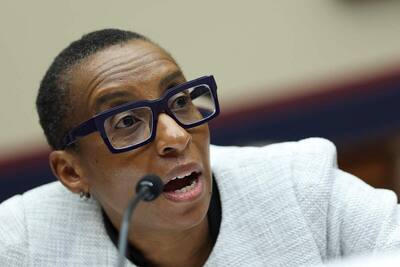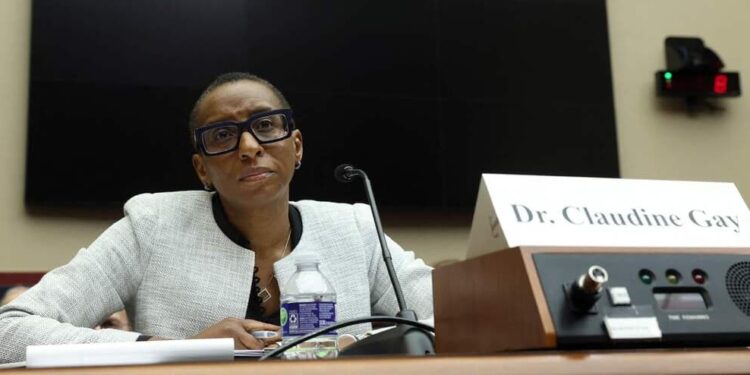The president of Harvard University was retained in her position on Tuesday despite “political pressure” in the United States and Israel, after her comments considered ambiguous on the fight against anti-Semitism on the campus, shaken by the deadly conflict in Gaza.
• Read also: Harvard president sharply criticized after congressional hearing on anti-Semitism
• Read also: The Israel-Hamas conflict plunges major American universities into a political crisis
“As members of the Corporation of Harvard, we reaffirm today our support for the continuation of the leadership mandate of President (Claudine) Gay,” indicates the highest authority of the prestigious university, founded 368 years ago in Cambridge, in the greater Boston area.
After an extraordinary board meeting Monday evening, the body expressed its “confidence that President Gay is the right leader to help our (university) community address the very serious societal issues we face.”
Getty Images via AFP
Claudine Gay, 53, born in New York into a family of Haitian immigrants, is a political science professor who became the first black president of Harvard University in July.
Passions
Since this weekend, a petition from nearly 700 professors has opposed calls and “political pressure” aimed at obtaining the resignation of Claudine Gay, accused of having mismanaged problems of anti-Semitism on campus.
Rabbi and leader of the Jewish student group Harvard Hillel, Getzel Davis reacted to Claudine Gay’s retention: “The most important thing for Jewish students at Harvard is that the culture changes, and that we have an administration who supports them, who names, denounces and fights against anti-Semitism wherever it occurs.
Since the bloody attack by Hamas in Israel on October 7, followed by deadly reprisals by the Israeli army in the Gaza Strip, the conflict has unleashed passions at renowned universities in the United States, such as Harvard.
On Tuesday, the historic campus in the heart of Cambridge, a small town with a British colonial feel, was calm, far from the tension that surrounded the pro-Palestinian demonstrations in October.
The few students who agreed to respond to AFP expressed the desire that an institution as renowned as Harvard remain neutral on the Israeli-Palestinian conflict, just like the United States: “Our country should stand away from the conflicts of other countries,” said Daniel Awgchew, 20 years old.

Getty Images via AFP
At an “institution” like Harvard, “we should be held to high standards when it comes to the things we should say and do. This represents, of course, considerable pressure,” underlined Marisa Gann, 19 years old.
As for Tad Elmer, a retiree from Cambridge, he “believes that universities should not be politicized”.
Rich donors and voices in the Republican camp, but also Democrats, have denounced an outbreak of anti-Semitic incidents on campuses and criticized a too weak response from university presidents, against a backdrop of recurring criticism from conservatives against American campuses that ‘they judge too far to the left.
“Context”
For political science professor Ryan Enos, one of the 700 signatories of the letter of support, “conservatives want to end freedom of expression on campuses.” “And they have already succeeded to some extent in silencing pro-Palestinian voices on university campuses,” he added to AFP.
Tuesday, December 5, in a tense atmosphere, Claudine Gay and her counterparts from the University of Pennsylvania (UPenn) and the Massachusetts Institute of Technology (MIT), Elizabeth Magill and Sally Kornbluth, responded for five hours to questions from elected officials from representatives room.
Among them, Republican Elise Stefanik, who likened calls for an “intifada” from pro-Palestinian students to an exhortation to “genocide against Jews in Israel and around the world.”
When Ms. Stefanik asked whether “calling for the genocide of Jews violates the Harvard harassment policy, yes or no?” Ms. Gay responded, “It may, depending on the context,” before adding, “If it does.” ‘is directed against a person.’
The controversy caused by these comments forced Elizabeth Magill to leave the presidency of UPenn on Saturday, and 70 elected officials, mainly Republicans, demanded the departure of Ms. Gay.
“President Gay apologized for the manner in which she testified before Congress and pledged to redouble the university’s efforts to combat anti-Semitism,” the Harvard Corporation said on Tuesday.
In Israel, a military ally of the United States, Prime Minister Benjamin Netanyahu denounced on Sunday an “outbreak of anti-Semitism on American campuses”, which the Holocaust memorial, Yad Vashem, compared to a “cancer”.



